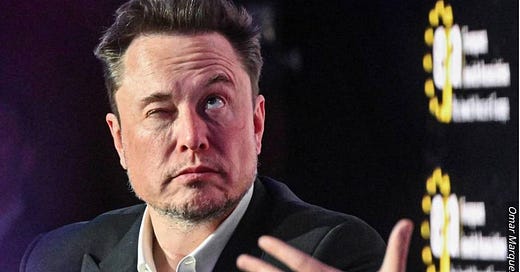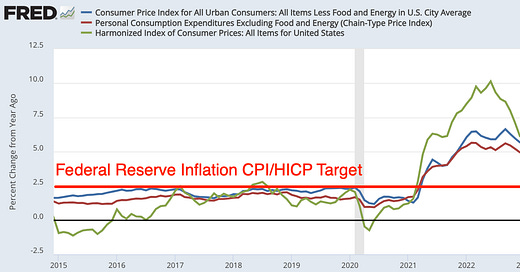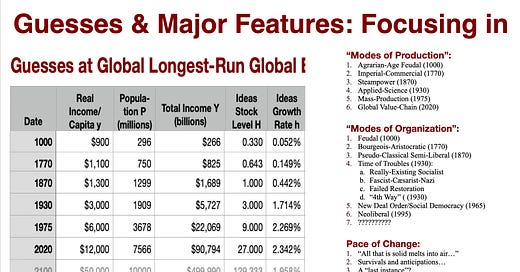
Discover more from Brad DeLong's Grasping Reality
PROJECT SYNDICATE: Musk Has Made Tesla a Meme Stock
& here is the Project Syndicate-edited version of my thoughts on how Tesla needs to replace Elon Musk with its very own Tim Cook pronto. I blame the $60 billion "compensation" package...
& here is the Project Syndicate-edited version of my thoughts on how Tesla needs to replace Elon Musk with its very own Tim Cook pronto. I blame the $60 billion "compensation" package...
Although Tesla appears to be wildly overvalued compared to rival automakers, its shareholders are betting that they can sell their holdings to a greater fool in the near future, and Elon Musk is eagerly indulging their speculative exuberance. None of it bodes well for company’s workers, suppliers, and other customers.
BERKELEY—From the standpoint of America and the world, Tesla is a historically important technology-generating enterprise—the tip of the spear in the transition away from internal-combustion-engine vehicles. From the standpoint of long-term shareholders, it has the potential to be a sustainable profit-making enterprise. From the standpoint of its suppliers, employees, and customers, it is a source of income and production.
And from the standpoint of Wall Street speculators, it is a bouncing ball in a roulette wheel: a tech-bubble casino play.
In early 2018, Tesla’s board of directors and shareholders approved a pay package for CEO Elon Musk granting him 12 tranches of stock options, each equal to about 1% of the company’s total equity, valued fully at some $55 billion. The first tranche would vest if Tesla’s market capitalization surpassed $100 billion, and each successive tranche would vest when it rose another $50 billion (provided that the company also met various revenue and cash-flow targets).
OVER AT PROJECT SYNDICATE: <https://www.project-syndicate.org/commentary/elon-musk-tesla-meme-stock-by-j-bradford-delong-2024-05>
That compensation package is now in the courts, where the Delaware Chancery has found that the process by which it was approved failed to meet the arms-length standard required of an executive who is also a shareholder with effective control over the company. Even so, Musk will probably prevail once all the legal i’s are dotted and t’s crossed. After all, the board is tame, and most Tesla shares are held by diehard Musk fans.
As a result, Musk holds about 22% of Tesla, instead of the 10% stake that he had before the pay package. Among his other holdings, SpaceX alone shows great promise. Nobody would be surprised if X (formerly Twitter), The Boring Company, and the others all went to zero. Musk may be worth $160 billion on paper, but his $120 billion stake in Tesla is the only component of his wealth that does not depend on some idiosyncratic buyer showing up with the right valuation at the right time.
Before the pay package, Musk was a run-of-the-mill Silicon Valley billionaire, though perhaps the most consequential one. He is clearly an effective fundraiser, cheerleader, and occasional coach for engineers working on battery technologies, electric vehicles, and rocket science. Without him, those technologies would not have been pushed forward as much as they have.
Though he is notorious for over-promising, Musk over-delivered in these cases. When the history of humanity’s effort to tackle climate change is written, the Musk of the 2010s will surely be one of the biggest heroes.
During that decade, Musk’s wealth was “only” around $9 billion. It rose to $20 billion or so as of mid-2019, and then to a peak of $340 billion in November 2021, before falling back to $170 billion. Meanwhile, Tesla’s market capitalization soared from $25 billion in the mid-2010s to $40 billion in mid-2019 to more than $1.1 trillion in late 2021, before falling back to $550 billion today.
That run-up unlocked all of his pay tranches and allowed him to shift his focus to other matters. He has moved from electric-power trains, charger networks, and batteries to social media, artificial intelligence, fully autonomous driving, humaniform Turing-class robots, robotaxis, and – most recently – using all of the chips in idle Tesla vehicles as a distributed AI supercomputer. Yet while the over-promising has continued, the over-delivering has not. The fundraiser, cheerleader, and coach for teams developing real technologies has become a meme-stock carnival barker.
To be sure, that, too, can be a lucrative business. But it is a profoundly different business from building a profitable enterprise that will attract long-term shareholders. In describing the current era of stock markets, Bloomberg’s Matt Levine reminds us that, “There is no law of nature requiring that a stock’s price has to equal the present value of its future cash flows, or even that it has to equal the market’s collective estimate of its future cash flows. That’s just a matter of tradition … Stocks can once again be pure tokens in a psychological gambling game.”
And so, we hear the following from Musk on Tesla’s most recent earnings call:
“We should be thought of as an AI or robotics company. If you value Tesla as just like an auto company, you just have to – fundamentally, it’s just the wrong framework … the way to think of Tesla is almost entirely in terms of solving autonomy and being able to turn on that autonomy for a gigantic fleet. And I think it might be the biggest asset value appreciation history when that day happens when you can do unsupervised full self-driving.”
But wait: “automotive revenues” accounted for over 80% of Tesla’s first-quarter sales. While car manufacturing does have substantial economies of scale, the value proposition does not come close to the level of infotech, where you can “write once and run everywhere” at zero marginal cost. Moreover, Tesla already has a price-to-earnings ratio of 46.8, compared to just 12.5 for the Ford Motor Company, which has been a profitable car-making business for most of the past century.
For all the current Tesla shareholders planning to offload their holdings in the next couple of years, everything hinges on the company succeeding as a meme stock, and Musk is diligently working toward that goal. Since there are virtually no long-term Tesla shareholders, the market does not particularly care that the company lacks a CEO who is trying to build it into an enduring profit-making organization.
But for Tesla’s employees, suppliers, and customers, the company’s success as a productive organization matters very much. And it is in the interest of America and the world that Tesla remain a technology-generating enterprise at the forefront of the net-zero transition.
Does anyone seriously think that the Musk of today is the right CEO to manage the Tesla we need? I no longer do. But I’m not holding my breath that the institutions of modern capitalism reach the same conclusion and respond accordingly.


















Musk: “We should be thought of as an AI or robotics company. If you value Tesla as just like an auto company, you just have to – fundamentally, it’s just the wrong framework … the way to think of Tesla is almost entirely in terms of solving autonomy and being able to turn on that autonomy for a gigantic fleet. "
Even if that were true, Tesla is not doing a good job of building self driving vehicles. Google (Alphabet)'s subsidiary, Waymo, is a superior technology in that regard, with a far lower accident rate to Tesla's record. This may be because Waymo uses expensive LIDAR as part of the sensing systemwhilst Tesla just uses cameras (because humans only have eyes). Tesla's humanoid robots are still smoke and mirrors. Maybe self driving cars are teh future - I certainly would like to use autonomous taxis if the far was low enough - but this has foild Uber, and even Apple exited the electric car business. Most EVs are still manually driven, and as far as being useful technology for transitioning away from fossil fuels - this is the relevant technology, not "self-driving". A horse 'self drives" more intelligently. Trains, ships, and planes all have some sort of "autopilot" to reduce the load on teh driver, but they all have a driver/captain anyway. I cannot imagine that any car will be entirely self-driving without the need for some human control - whether an onboard or remote driver. to takeover in unexpected conditions outside of the "trained" conditions of the AI. As MIT has shown, culture also determines responses when choices have to be made - kill the passenger, the pedestrians, older people vs the young, etc. This means there is no universal FSD technology. There may not be on any likely investment horizon. So the idea remains a hard nut to crack or perhaps a scifi fantasy.
The other issues with Tesla is teh aftermarket in used cars. Who wants to buy a cheaper used Tesla when the monthly costs for many of teh features still have to be incurred to drive the car and be serviced at Tesla's demand or the car is bricked. [And don't forget the NDA]. My guess is that other manufacturers will soon surpass tesla on price and quality, leaving Teslas as luxury collectors' cars, rather than mass market ones, ensuring the economies of scale will fall behind the competitors used to delivering what customers' want, not what the CEO's ego wants.
I blame the two guys who told Musk that he should buy and run Twitter, thus distracting him from Tesla.
But seriously, Tesla doesn't rely on advertising because Musk himself provides so much marketing. That's a reason why he should be paid as much as any other car maker's ad expense - if his marketing were not now a negative to car sales. Given that, what should his compensation be? Tesla needs someone to pitch how much cheaper electricity is than gasoline. They need someone to guide new EV consumers to products for in-home charging stations, batteries, and garage top PV's. They need to pitch 'Never again pay for gasoline, or even for EV charging.' And they need someone to pitch to the government the need for a better electrical grid.
But Musk can't pitch any of those because he's pitching Tesla's unsustainable stock price, because he's pitching neo-fascist conspiracy theories, and because he can't personally handle success.